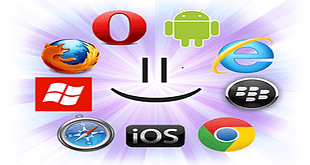HTML5 ! Imagine for a moment that an author has a fledgling career. They have published their breakthrough novel, and now theirs is the name on everybody’s lips.
They have an incredible idea for their new page-turner and have just finished writing it in their mother tongue, but now the world has heard their name and multiple countries want their own translation of the masterpiece.
What does the author do? Learn several languages, so they can personally translate their work for these new markets exactly as they want it to be, or hire one or several translators who may miss out crucial plot points, but will create understandable literature?
Although farfetched in that scenario, this is the dilemma has been brought about with the explosion in popularity of using mobile phones to get online. As a result, many of the companies you have encountered on the web at home are playing catch-up in an attempt to get a toe in the door of this new way of browsing on the go. But something has happened recently akin to our author’s translation problem – there is a new language that these companies can use to peddle their wares.
HTML5 isn’t new in the strictest sense of the word, more of an upgrade, but this is an aside ( If you need to update to HTML5 please take a look a our HTML5 Training courses ). It’s the equivalent of our author’s translator – you give it a novel, or in our case web page and it will tirelessly and consistently present it to the different mobile platforms out there.
The real dilemma faced by those wanting to get more of their lower limb into the mobile web scene is whether they do this, or spend time and effort learning a new language each time they want to expand into a new brand of phone – the equivalent of our author personally translating their work for each new language.
Page Contents
HTML5 Preferable to Native Apps
Problem With HTML5
At the moment, when I take into consideration the fairly new nature of HTML5, the issue of compatibility is a key sticking point. There are some web browsers on which HTML5 just doesn’t work. It’s the equivalent of part of the population in our author’s world speaking a language that nobody can translate to or from; meaning this group of people can’t appreciate the literary genius of our author.
Other Side Of The Coin About HTML5
On the other side of the coin, it makes creating apps for mobile phones much easier for the creators, as it gives them complete control over how the app works, looks and feels. This in turn benefits you and me when we use their app, as we’re not left frustrated that the app for our mobile phone has been under appreciated by its creator, who is too busy making the same app work on a dozen other types of phone to be concerned with our annoyances.
Is HTML5 Preferable?
So is HTML5 preferable? In my opinion, yes but not yet. It has happened with many new technologies and will continue to happen with new technologies to come. From VHS, Blu-Ray and probably even as far back as the wheel – uptake is slow, but one day it may be dominant.
 Tricks Window Technology Zone – Complete Technology Package for Technology News, Web Tricks, Blogging Tricks, SEO, Hacks, Network, Mobile Tricks, Android, Smartphones etc.
Tricks Window Technology Zone – Complete Technology Package for Technology News, Web Tricks, Blogging Tricks, SEO, Hacks, Network, Mobile Tricks, Android, Smartphones etc.




